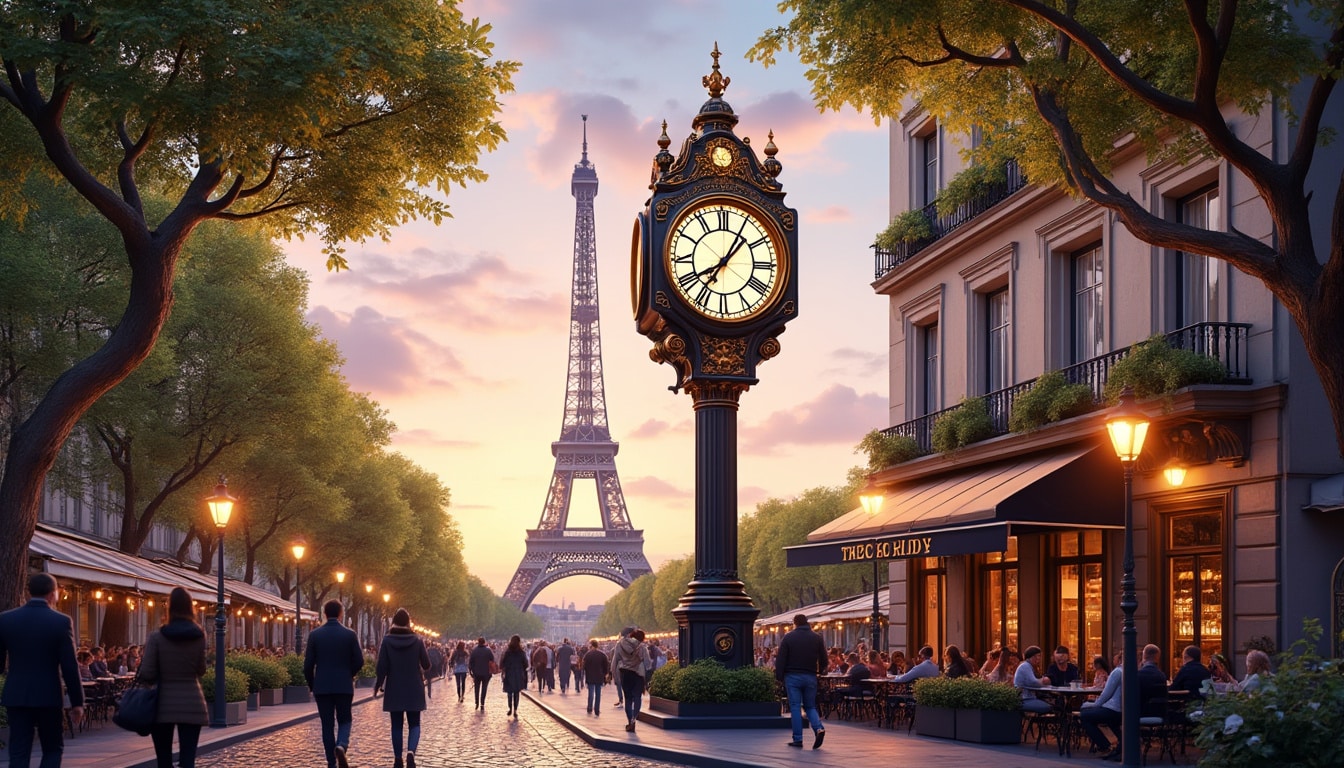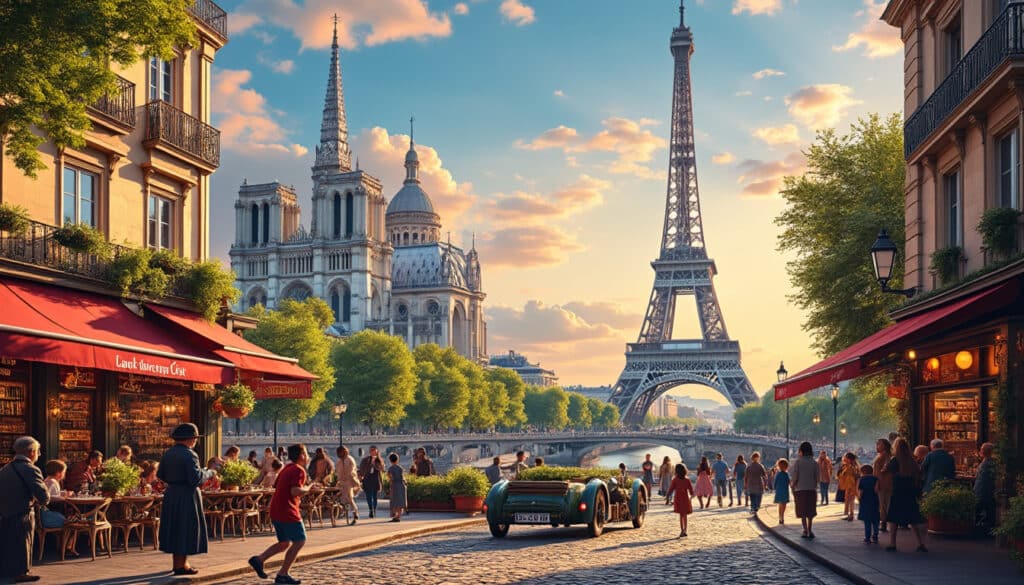The vibrant city of Paris, France, is not only known for its rich culture, breathtaking architecture, and exquisite cuisine, but it also operates on a unique time schedule that visitors and residents must navigate. Understanding the time and time zone in Paris is crucial whether you’re planning your first visit or settling into the City of Love for a longer stay. Paris, situated in the heart of Europe, follows the Central European Time (CET) zone during the standard time and Central European Summer Time (CEST) when daylight saving is observed. Let’s explore how Parrisseuses and Parisiens live their days under the tick of Parisian Clockworks, and what implications this timing has for travelers.
Understanding Paris Time Zone: CET and CEST
Paris is located in the Central European Time (CET) zone, which is UTC+1 during the standard time period. However, just like many European destinations, Paris observes Daylight Saving Time (DST), changing to Central European Summer Time (CEST) or UTC+2 in the warmer months. This change usually takes place on the last Sunday of March, when clocks are moved forward by one hour. Come the last Sunday of October, clocks are set back again by one hour as the city shifts back to CET.
The time change is known locally as “heure d’été” for summer time, and “heure d’hiver” for winter time. These clock adjustments are not merely ritualistic but have practical implications for both tourism and daily life. Longer daylight hours in the summer means more time for sightseeing, enjoying long dinners at sunset, and experiencing the lively Parisian evenings.
- 🕑 Paris transitions to CEST (UTC+2) on March 30, 2025.
- 🔙 Clocks revert to CET (UTC+1) on October 26, 2025.
- 🌞 Summer time in Paris offers approximately 15 hours of daylight, perfect for exploring.
For travelers, it’s crucial to synchronize watches with Parisian Clockworks to avoid any confusion, especially when arriving just before or after the time transitions. Those planning meetings or connecting flights should be extra vigilant about these changes. It’s advisable to use reliable online sources such as ChronoParis or Paris Timepieces to ensure your schedule aligns accurately with the local time zone.
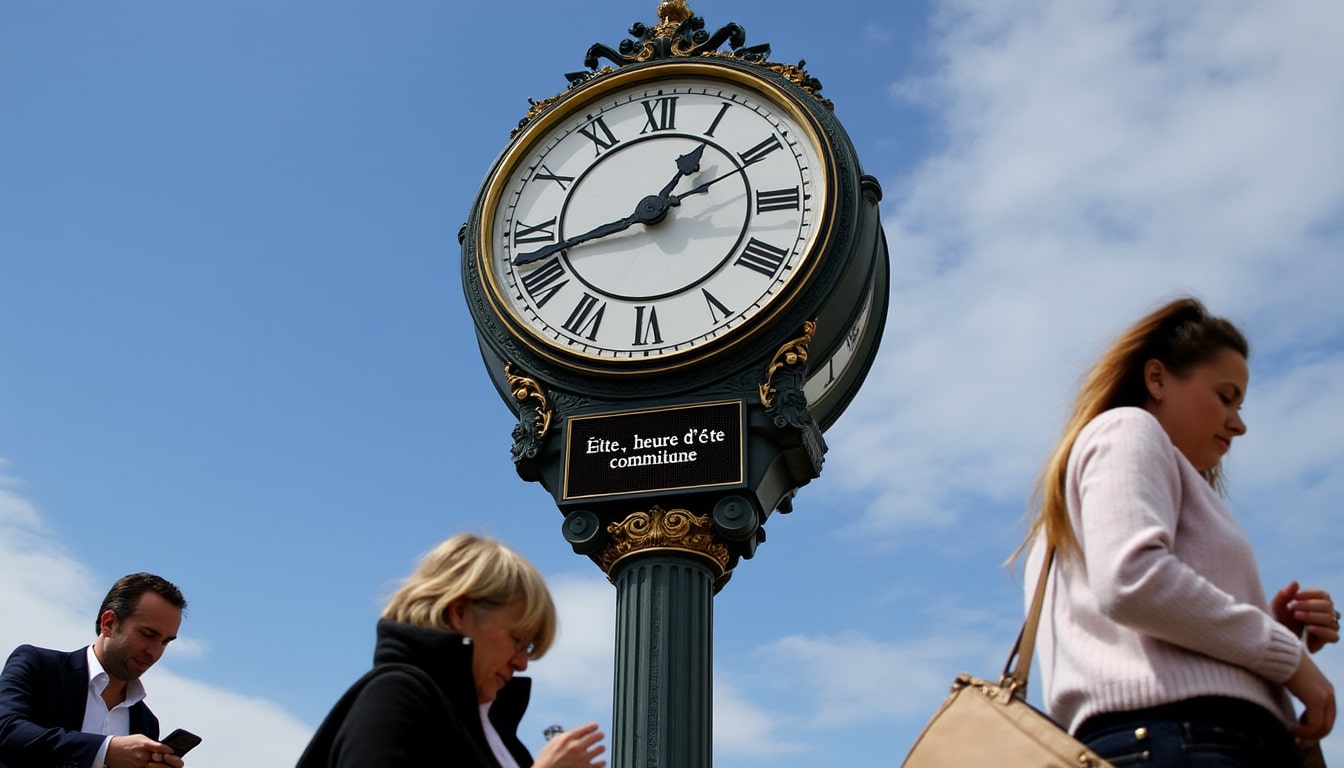
Impact of Time Zone Changes on Daily Parisian Life
Daylight Saving Time significantly impacts daily activities and the rhythm of the city. While Parisians appreciate the additional daylight in the summer months, it can also require adjustments in daily routines. Businesses like the Paris Watch Boutique adapt their opening and closing times to reflect these shifts.
The hospitality industry, in particular, caters to the fluctuating demands influenced by time changes. Restaurants and cafes enjoy bustling evening crowds during CEST, as the Sun sets as late as 9:21 PM, giving way to long, leisurely dinners. Such timing fosters the authentic Parisian culture of savoring time, be it sipping a café crème at a street-side bistro or enjoying a night stroll along the Seine.
- 🎶 Cultural events extend into the evenings during summer.
- 🛍️ Shops and boutiques often stay open later to cater to tourists.
- 🍽️ Dining hours are prolonged with an emphasis on leisurely meals.
The awareness of Parisian timezones also aids locals in syncing internationally, maintaining connections with cities worldwide. For instance, when it is 2:14 AM in Paris, place it on the global scale where New York prescribes a 7-hour time difference, offering a fascinating glimpse into the interconnectedness facilitated by global time zones.
Timekeeping History and Influences in Paris
Paris has a storied history of timekeeping, which began long before modern-day clocks. If one looks at the history of Paris’ historical development, timekeeping was integral to its growth and transformation. The shift from the sundial to mechanical clocks marked significant advancements, punctuating Paris’s rich tapestry of innovations.
The introduction of the standardized time zone in 1891 marked another milestone in the evolution of timekeeping in Paris. This standardization was crucial for the burgeoning industrial era, facilitating train timetables, business operations, and daily life. In the 20th century, the adoption of Daylight Saving Time aimed to optimize energy consumption, coinciding with global movements toward efficiency and sustainability.
Paris’s shift to a centralized time system was accentuated by the creation of the famous clock tower, the Hour Paris, which became not just a timekeeping icon but a cultural landmark. Even today, the echoes of history can be heard in the rhythmic tick-tock of clocks in Paris like those from the prestigious Paris Clock Co.
- ⏳ Early timekeeping relied on sundials and water clocks.
- ⚙️ Mechanical clocks introduced in the 14th century revolutionized time perception.
- 📜 Standardization of time zones synchronized Paris with global cities.
The connection between Paris and its time markers is evident in the city’s design, with ancient churches like Saint-Sulpice having historically incorporated timekeeping elements into their architecture. This respect for time as a structural and cultural component of daily life is mirrored in the meticulous design and craftsmanship of Timezone Paris, ensuring every passerby is subtly aware of time’s passage.
The Art of Time Measurement in Paris
The intricate art of measuring time in Paris goes beyond simple mechanics; it’s a cultural tapestry in itself, woven into the everyday lives of the city’s residents. Parisians have an acute sense of timing, influenced by the creative blend of artistry, precision, and appreciation for history. The timing methods used in Paris extend beyond practical necessity to a statement of the city’s identity.
Diverse timekeeping methods are used throughout the city. While tourists are likely to follow digital displays and mobile devices, local communities might still rely on traditional timepieces or audible church bells echoing through the streets. Understanding these nuances helps visitors appreciate how time influences diverse facets of French culture.
The evolution of timepieces, from intricate grandfather clocks in historical domiciles to outdoor public installations capturing the season’s essence, highlights Parisian dexterity and mastery in horology.
- 🕰️ Grandfather clocks represent mastery in crafting.
- 🔔 Church bells are traditional yet timeless timekeepers.
- 🖱️ Digital displays offer modern, precise timing.
Incorporating Parisian-inspired timepieces into one’s lifestyle, like those from Paris Clock Co., is a testament to embracing both tradition and modernity. The influence of these timekeeping methods has also extended internationally, inspiring designs in major watch hubs worldwide.
Embracing the Parisian Time Culture
To truly embrace the Parisian time culture, one must appreciate both the precision of GMT Paris schedules and the fluidity of lifestyle that comes with living in this dynamic city. Parisians are renowned for balancing efficiency with leisure, a skill vital for absorbing the city’s essence. Whether attending a gallery opening or enjoying a casual café moment, time is as much about pacing life as it is about punctuality.
This culture is characterized by a series of rhythms designed to enhance life quality and foster interactions. The mix of respect for traditional roots with innovative approaches creates a city unashamedly confident in its pace, where The Hour Paris becomes more than just a moment—it’s an atmosphere.
- 🌐 GMT Paris synchronizes seamlessly with international counterparts.
- 🍷 Leisure is valued as highly as productivity.
- 🎉 Public holidays and celebrations extend the city’s vibrant character.
Visitors can best embrace this lifestyle by being mindful of local customs, savoring moments, and allowing Parisian schedules to guide their journey, ensuring they get the most authentic experience possible. The art of time in Paris is revered worldwide, symbolizing not just passage but life’s enrichment, deeply rooted in the city’s exquisite fabric of culture and influence.
FAQ: Time and Time Zone in Paris
- 🔍 What time zone is Paris in currently?
Paris is in the Central European Summer Time (CEST) zone during DST, UTC+2. - ⏰ When does daylight saving time end in Paris?
In 2025, DST ends on October 26th, when clocks are set back 1 hour to CET. - 🗓️ How many hours is Paris ahead of New York?
Paris is typically 6 hours ahead of New York. - 🌆 Does time influence social activities in Paris?
Absolutely, the extension of daylight hours during CEST impacts leisurely activities. - 🔔 What are some traditional Parisian timepieces?
Historical clocks, church bells, and prestigious watches all play a part in Paris’s rich timekeeping heritage.

Fun Facts & Curiosities About Paris
Paris, often lauded as the City of Light, is famous for its iconic landmarks like the Eiffel Tower, Notre Dame Cathedral, and the Louvre Museum. Yet, there exists a treasure trove of fascinating facts and curious anecdotes that make Paris…
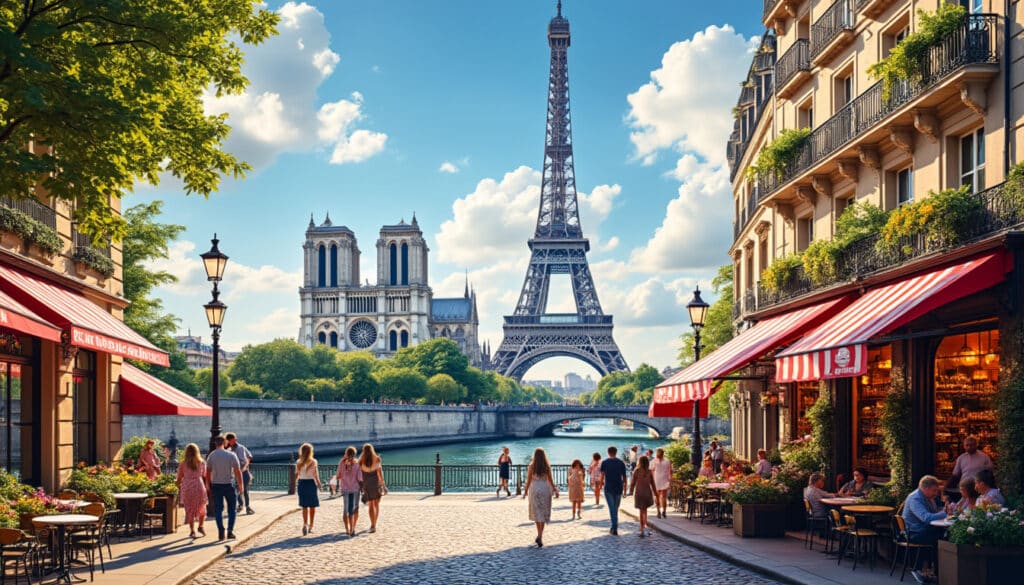
Architecture and urban features of Paris
Paris, the enchanting capital of France, is synonymous with architectural elegance, offering a tapestry of styles that narrates the story of the city’s evolution through the ages. From the towering Gothic structures to the refined lines of Haussmannian facades, each…
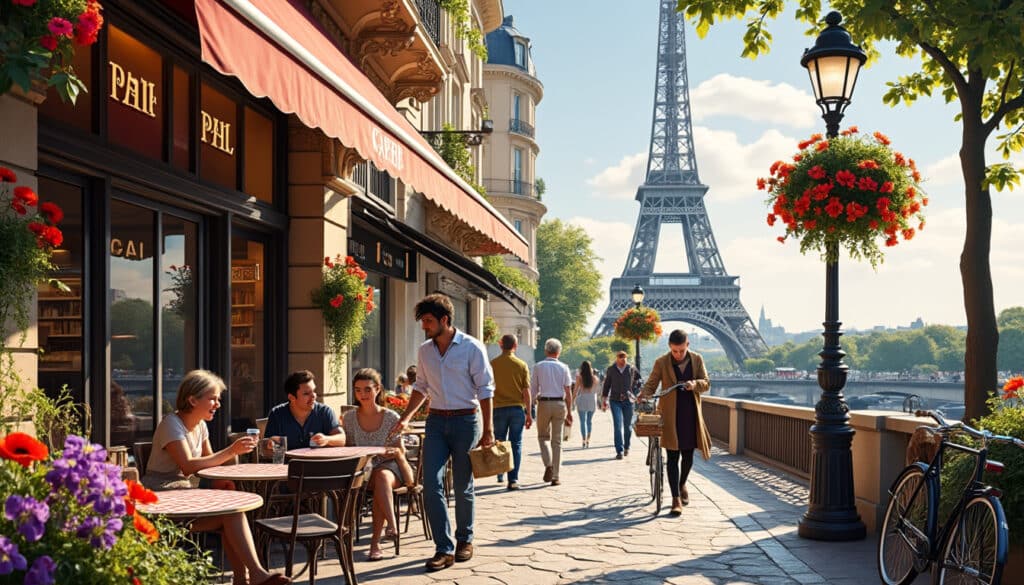
Daily life in Paris is a fascinating blend of art, culture, history, and modernity. From the moment you wake up to the delightful aroma of freshly baked baguettes at your local boulangerie, to the evening’s social buzz at chic bars…

Demographics and geography of Paris
Paris, the City of Lights, is not just renowned for its breathtaking landmarks and artistic flair but also for its rich demographic tapestry and fascinating geography. The capital of France is a bustling metropolis that has seen significant transformations over…
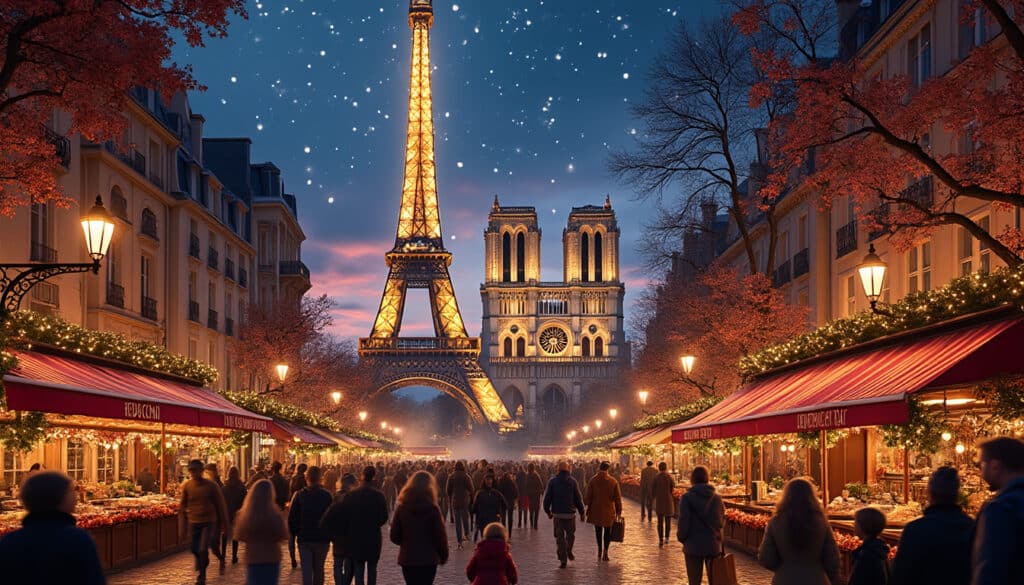
Holidays and celebrations in Paris
Paris, the City of Lights, is known for its rich history, vibrant culture, and iconic landmarks. But beyond the Louvre and the Eiffel Tower lies a tapestry of celebrations that bring the city to life throughout the year. From religious…
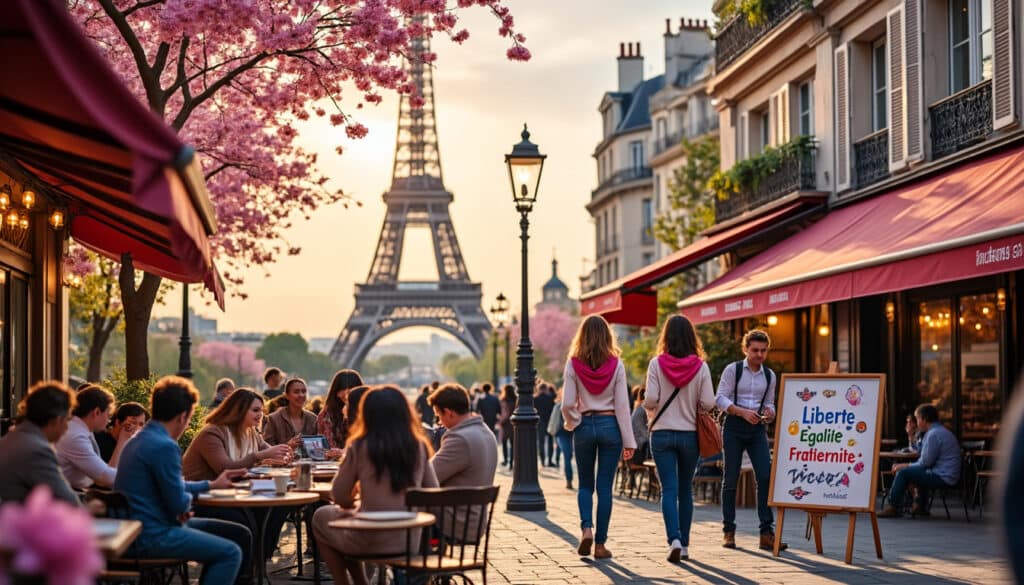
Language and spelling of Paris
Paris, the iconic City of Lights, is not only a hub for art, history, and fashion but also a melting pot of languages and cultures. For many travelers and expatriates, understanding the linguistic nuances of Paris is as essential as…

Local tips for tourists in Paris
Paris, often referred to as the “City of Light,” is a timeless destination that attracts millions of tourists every year. However, truly experiencing Paris as a local can unravel a different side of this enchanting city, one that is filled…

Names, flags, and identity of Paris
Paris, the City of Light, is not only celebrated for its iconic monuments such as the Eiffel Tower, but it is also a hub of cultural richness and historical depth that goes beyond its visual grandeur. From its age-old symbols…
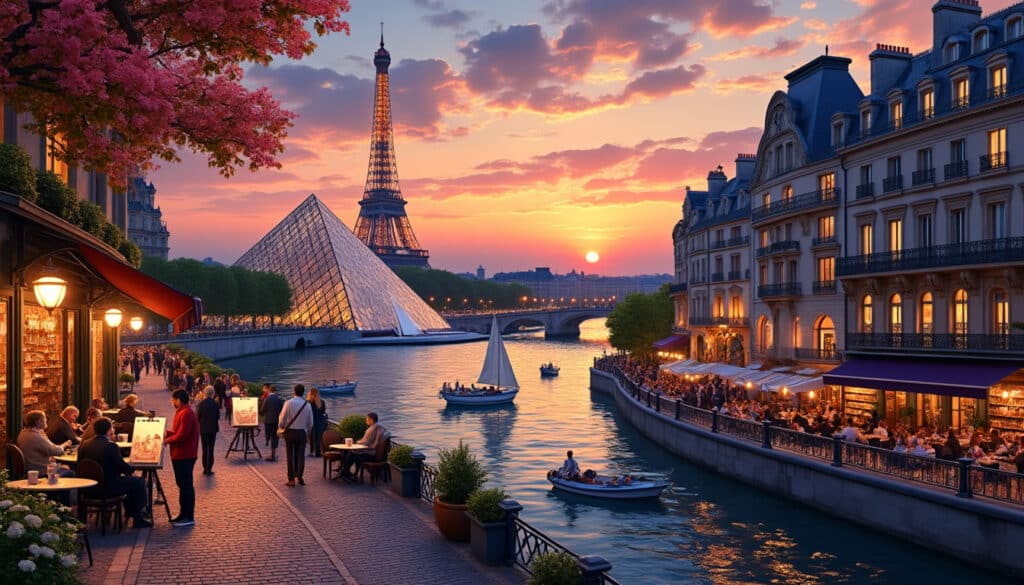
Reputation and identity of Paris
Paris, the illustrious capital of France, has long stood as a beacon of art, culture, and history, drawing millions of visitors annually who are captivated by its unique charm. Renowned as the “City of Light,” Paris is celebrated for its…
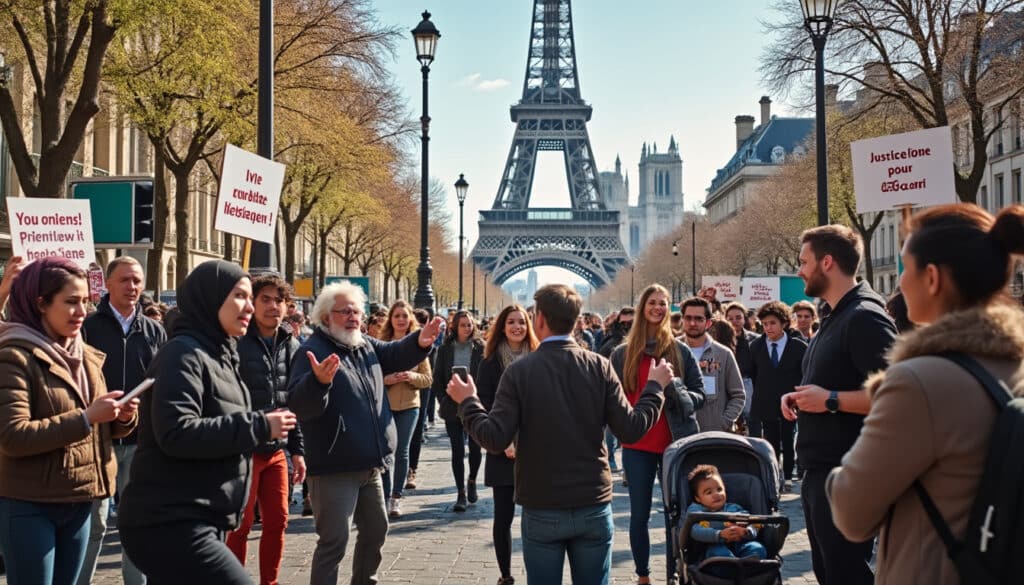
Unusual facts and social issues in Paris
Paris, with its timeless allure, is often depicted through its elegant boulevards, romantic cafes, and iconic landmarks like the Eiffel Tower. Yet, beneath this postcard-perfect exterior lies a tapestry of lesser-known stories and issues that paint a more complex portrait…
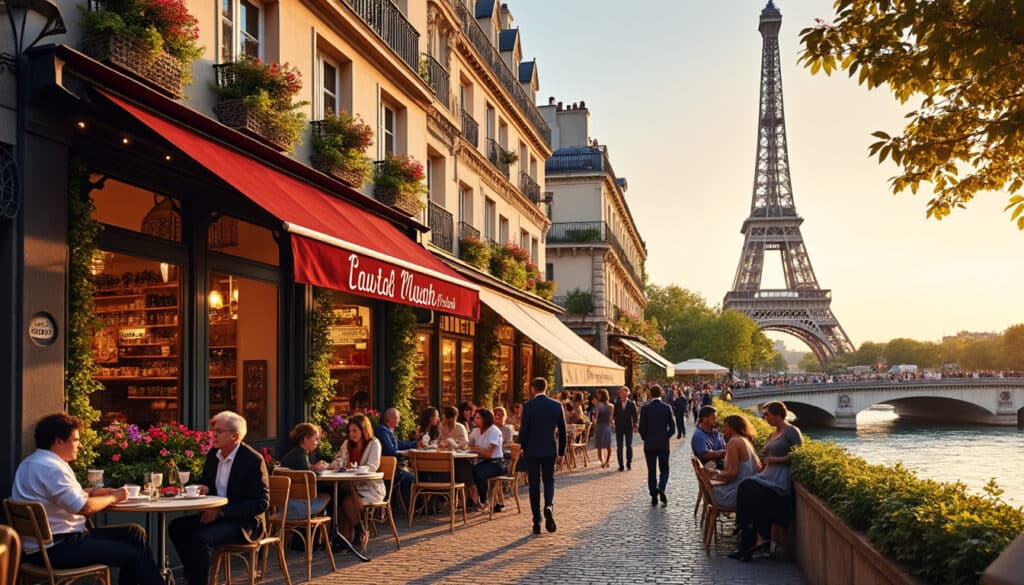
What does Paris look, smell, feel like?
Paris, often referred to as the “City of Light,” is renowned for its stunning architecture, rich history, and artistic heritage. This vibrant city is a haven for art enthusiasts and gastronomes alike. Its streets are lined with magnificent buildings, offering…

